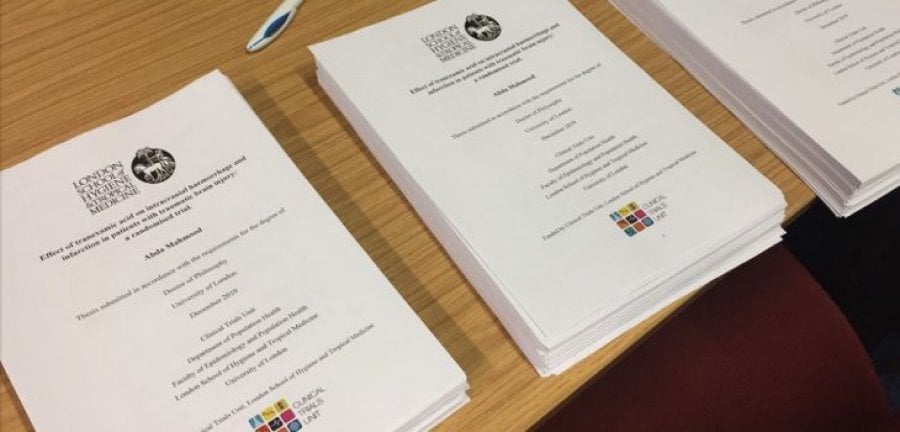Post PhD reflections
9 April 2020 London School of Hygiene & Tropical Medicine London School of Hygiene & Tropical Medicine https://lshtm.ac.uk/themes/custom/lshtm/images/lshtm-logo-black.png
I handed in my PhD thesis in mid-December 2019 after a little more than 4 years of registration at LSHTM. Truthfully, I didn’t feel like it was ready to submit as I had been scrambling till after midnight the previous night stuck in a vicious cycle of reading, editing, re-reading, and editing. By the time I handed it in, it felt unsettling, anti-climactic, and a relief all at once. At least it was out of my hands for a while!
The previous 4 years had been challenging. I learnt a lot about epidemiology through my PhD. I worked on a large clinical trial in patients who had suffered brain trauma. We were testing a treatment we thought would reduce bleeding into the brain following a head injury and the associated risk of death. A big part of my PhD was to actually measure the bleeding in a sample of trial patients by looking at their brain scans in hospital. That’s how we think the treatment works and if we can show this then it could help explain the trial results. Sounds easy right? Wrong. It took more than four years to find that this is very difficult to do, especially when using routinely collected clinical data like I was.
Through the process I learnt about bias, random error, neuropathology, radiology, missing data, complex statistical tests, transparent reporting, clarity in communication, and that incidental findings can be more important than what you were looking for in the first place. I also learnt about myself. The project required focus and perseverance, and I was prepared for the intellectual challenge. I hadn’t however been prepared for the rollercoaster that sometimes come with navigating different management styles, knowing when to take breaks, losing confidence, and achieving a work-life balance.
I got through the more challenging times by doing things, both in and out of the school, that helped me to distance myself from the day-to-day tasks of my PhD. I got involved in public engagement activities like the pint of science festival and three-minute thesis competition (see below for smiles post-participation). I also volunteered to be a student representative for PhD students. This helped me to meet more students and engage in improving the student experience at the school. I also had a few counselling sessions and regularly attended the YMCA club for exercise – both of which really helped me to get out of my own head.


Some of the things I loved (and sometimes hated) about my PhD was that it’s a very independent project that I could drive. My project was nested in an established trial and lends itself to publications that I could lead. I had advisors and colleagues with excellent expertise in epidemiology, clinical trials, statistics, and clinical practice, and I learned so much from them over the years. I also had the wonderful opportunity of spending a few months in Malaysia (see below) to collect data from some of the hospitals there. I made friendships and professional relationships with nurses and doctors and saw how Emergency Departments were organized in an international setting. This enhanced my understanding of the global scope of clinical research at LSHTM.

The final year of my PhD was a blur of data cleaning, writing statistical code, unblinding my project, exploring the data, presenting the results at international meetings, preparing publications, and pulling my thesis together into a respectable document. Large parts of the first half of my thesis had been written in the first 2 years, and these were pulled together and the final chapters added in the final few months before submission. I was shocked when I printed it out and it looked like this:

I had written an actual book! It feels great to have a tangible summary of the work after all this time. This book details the decisions I made in my PhD and why, and ultimately this process is what made me a better researcher. For anyone going through this process, chances are you are making progress and learning even if the outputs can’t be quantified.
Two examiners trawled through my thesis and in February 2020 I passed my PhD after a viva that lasted a little over an hour! I felt relieved and completely elated. I had done it! I am now looking forward to putting these hard-earned skills to good use.